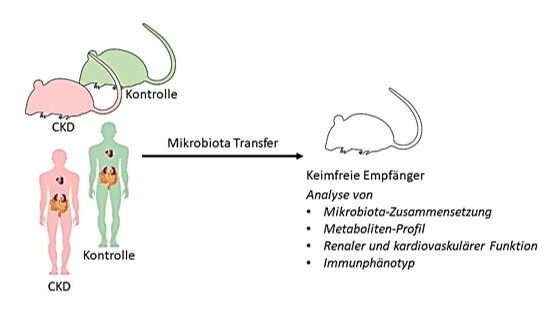Impact of the microbiome and the immune system on cardiovascular risk in chronic kidney disease
Scientific interest within the context of the graduate college:
Our laboratory investigates the interaction of dietary factors with the gut microbiota and the host, especially with the host’s immune system, in the context of cardiovascular and renal disease.1-4 Arterial hypertension and chronic kidney disease (CKD) are of particular interest, as both conditions are associated with a significantly increased cardiovascular risk. We combine experimental model systems with exploratory clinical studies to better understand the microbiota-host interaction. We aim to use our findings to further define health in this context and to better understand transitions to disease.
CKD is associated with dysregulated immune responses5 and high cardiovascular risk.6 In addition, CKD is associated with changes in the composition and function of the microbiota. Indole metabolites of bacterial origin are of particular interest here, as they can accumulate in the blood with declining renal function and have an immunomodulatory potential.3 It is unclear to what extent these CKD-associated microbial changes contribute to cardiovascular risk. To investigate this question, microbiota from CKD patients, as well as from CKD mouse models and healthy control groups will be transplanted into germ-free mice. In the recipients, immunological changes and cardiovascular parameters will be quantified and the molecular mechanisms involved will be investigated in more detail.
Project description:
WP 1: Microbiota transfer from CKD mouse models. Fecal samples from different CKD animal models (incl. healthy controls) will be analyzed (composition, metabolites) and used to colonize germ-free mice. The recipients will then be phenotyped in regard to their immune function (isolation of immune cells from different end organs and analysis by flow cytometry) and cardiovascular function (vascular and cardiac function, intestinal barrier, etc.) and compared with parameters of the donors.
WP2: Microbiota transfer of human-associated microbiota. Stool samples from CKD patients and healthy controls will be collected, analyzed by sequencing (composition, metabolites), and transplanted into germ-free mice (Fig. 1). Immunological, microbial, and cardiovascular parameters will be analyzed between the two groups of recipients and the extent to which human CKD-associated pathologies are transferable to the mouse model will be investigated.

References
- Bartolomaeus H, Balogh A, Yakoub M, […], Muller DN, Stegbauer J, Wilck N. Short-Chain Fatty Acid Propionate Protects From Hypertensive Cardiovascular Damage. Circulation. 2019; 139:1407-1421. doi: 10.1161/CIRCULATIONAHA.118.036652.
- Wilck N, Balogh A, Marko L, Bartolomaeus H and Muller DN. The role of sodium in modulating immune cell function. Nat Rev Nephrol. 2019; 15:546-558. doi: 10.1038/s41581-019-0167-y.
- Wilck N, Matus MG, Kearney SM, […], Linker RA, Alm EJ, Muller DN. Salt-responsive gut commensal modulates TH17 axis and disease. Nature. 2017; 551:585-589. doi: 10.1038/nature24628.
- Bartolomaeus H, Avery EG, Bartolomaeus TUP, […], Wilck N, Kushugulova A, Forslund SK. Blood Pressure Changes Correlate with Short-Chain Fatty Acids Production Shifts Under a Synbiotic Intervention. Cardiovasc Res. 2020; 116:1252-1253. doi: 10.1093/cvr/cvaa083.
- Sato Y, Yanagita M. Immunology of the ageing kidney. Nat Rev Nephrol. 2019; 15:625-640. doi: 10.1038/s41581-019-0185-9.
- Go AS, Chertow GM, Fan D, McCulloch CE, Hsu CY. Chronic kidney disease and the risks of death, cardiovascular events, and hospitalization. N Engl J Med. 2004; 351:1296-305. doi: 10.1056/NEJMoa041031.

